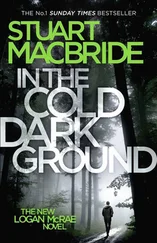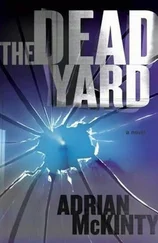Adrian McKinty - The Cold Cold Ground
Здесь есть возможность читать онлайн «Adrian McKinty - The Cold Cold Ground» весь текст электронной книги совершенно бесплатно (целиком полную версию без сокращений). В некоторых случаях можно слушать аудио, скачать через торрент в формате fb2 и присутствует краткое содержание. Жанр: Триллер, на английском языке. Описание произведения, (предисловие) а так же отзывы посетителей доступны на портале библиотеки ЛибКат.
- Название:The Cold Cold Ground
- Автор:
- Жанр:
- Год:неизвестен
- ISBN:нет данных
- Рейтинг книги:5 / 5. Голосов: 1
-
Избранное:Добавить в избранное
- Отзывы:
-
Ваша оценка:
- 100
- 1
- 2
- 3
- 4
- 5
The Cold Cold Ground: краткое содержание, описание и аннотация
Предлагаем к чтению аннотацию, описание, краткое содержание или предисловие (зависит от того, что написал сам автор книги «The Cold Cold Ground»). Если вы не нашли необходимую информацию о книге — напишите в комментариях, мы постараемся отыскать её.
The Cold Cold Ground — читать онлайн бесплатно полную книгу (весь текст) целиком
Ниже представлен текст книги, разбитый по страницам. Система сохранения места последней прочитанной страницы, позволяет с удобством читать онлайн бесплатно книгу «The Cold Cold Ground», без необходимости каждый раз заново искать на чём Вы остановились. Поставьте закладку, и сможете в любой момент перейти на страницу, на которой закончили чтение.
Интервал:
Закладка:
“You own it?” Sergeant McCallister asked.
I nodded. Most people still rented in Victoria Estate, but a few people were buying their council houses from the Northern Ireland Housing Executive under Mrs Thatcher’s privatization plans. I had bought the place vacant for only?10,000. (The family that had lived here had owed two year’s rent and one night just upped and vanished. To America, some said, but nobody really knew.)
“You painted it pink?” Price asked with a grin.
“That’s lavender, you colour-blind eejit,” I said.
McCallister saw that Price clearly hadn’t got the message yet. “Hey lads, you know why Price nearly failed the police entrance exam? He thought a polygon was a dead parrot.”
The lads chuckled dutifully and somebody punched Price on the shoulder.
McCallister winked at me. “We have to head, mate,” he announced and with that they closed the back doors of the Rover.
“See you!” I shouted after them as they drove off, but it was unlikely they heard me through the bulletproofing and armour plate.
I stood there looking ridiculous with my full riot gear, helmet and Sterling sub-machine gun.
A wee lad was gawping at me. “Is that a real gun, mister?” he asked.
“I certainly hope so,” I said, opened my gate and walked down the garden path. It wasn’t a bad house: a neat job in the middle of the terrace, built in the 1950s, like the rest of Victoria Estate, Carrickfergus for the Protestant working poor. Of course these days hardly anybody was working. The ICI textile plant had closed last year, in the autumn of 1980, and they had employed one in every four men in Carrick. Now the town had an unemployment rate of twenty per cent and it would have been worse but for emigration to England and Australia and the brand new DeLorean factory that had just opened in Dunmurray. If people bought DeLoreans in anything like the numbers predicted then Carrickfergus and Northern Ireland had a chance. Otherwise …
“Busy night?” Mrs Campbell asked from next door.
Mrs Campbell … I smiled and said nothing. Best not to. She was trouble. Thirty-two. Red hair. Looker. Husband away on the North Sea oil rigs. Two weans under ten. There was no way.
“You know, what with the riots and everything?” she insisted while I hunted for my keys.
“Aye,” I said.
“I suppose you heard about the Pope?”
“Yes.”
“You could find about a dozen suspects on this street,” she said with a cackle.
“I’m sure you could,” I agreed.
“Personally, mind, I find it shocking, really shocking,” she said.
I blinked a couple of times and looked straight ahead. This statement worried me. It meant that she was trying to show empathy, which led me to the inescapable conclusion that she probably fancied me and that she (and everybody else on the street) knew that I was a Catholic.
I hadn’t been here three weeks, barely spoken to anyone. What had I done in this time to give myself away? Was it the way I pronounced the letter “H” or was it just that I was marginally less sour than Coronation Road’s dour Protestant population?
I put the key in the lock, shook my head and went inside. I hung up my coat, took off my bulletproof vest and unbuckled the handgun. In case we’d been needed for riot duty I’d also been issued with a CS gas canister, a billy club and that scary World War Two machine gun — presumably to deal with an IRA ambush en route. I carefully put all these weapons on the hall table.
I hung my helmet on the hook and went upstairs.
There were three bedrooms. I used two for storage and had taken the front one for myself as it was the biggest and came with a fireplace and a nice view across Coronation Road to the Antrim Hills beyond.
Victoria Estate lay at the edge of Carrickfergus and hence at the edge of the Greater Belfast Urban Area. Carrick was gradually being swallowed up by Belfast but for the moment it still possessed some individual character: a medieval town of 13,000 people with a small working harbour and a couple of now empty textile factories.
North of Coronation Road you were in the Irish countryside, south and east you were in the city. I liked that. I had a foot in both camps too. I’d been born in 1950 in Cushendun when that part of rural Northern Ireland was like another planet. No phones, no electricity, people still using horses to get around, peat for cooking and heating, and on Sundays some of the crazier Protestants rowing or sailing across the North Channel in little doreys to attend the kirk in Scotland.
Aye, I’d been whelped a country boy but in 1969, right as the Troubles were kicking off, I’d gone to Queen’s University Belfast on a full scholarship to study psychology. I’d loved the city: its bars, its alleys, its character and, at least for a while, the university area was immune to the worst of the violence.
It was the era of Seamus Heaney, Paul Muldoon, Ciaran Carson, and QUB was a little candle of light held up against the gathering dark.
And I’d done well there if I say so myself. Nobody was doing psychology in those days and I’d shone. Not much competition, I suppose, but still. I’d gained a first-class degree, fell in and out of love a couple of times, published a little paper on the unreliability of eyewitness testimony in the Irish Journal of Criminology and perhaps I would have stayed an academic or gotten a job across the water but for the incident.
The incident .
Why I was here now. Why I’d joined the peelers in the first place .
I stripped off the last of my police uniform and hung it in the cupboard. Under all that webbing I had sweated like a Proddy at a High Mass, so I had a quick shower to rinse out the peeler stink. I dried myself and looked at my naked body in the mirror.
5’ 10”. 11 stone. Rangy, not muscled. Thirty years old but I looked thirty unlike my colleagues on sixty cigs a day. Dark complexion, dark curly hair, dark blue eyes. My nose was an un-Celtic aquiline and when I worked up a tan a few people initially took me as some kind of French or Spanish tourist (not that there were many of those rare birds in these times). As far as I could tell there wasn’t a drop of French or Spanish blood in my background but there were always those dubious sounding local stories in Cushendun about survivors from the wreck of the Spanish Armada …
I counted the grey hairs.
Fourteen now.
I thought about the Serpico moustache. Again dismissed it.
I raised an eyebrow at myself. “Mrs Campbell, it must be awful lonely with your husband away on the North Sea …” I said, for some reason doing a Julio Iglesias impersonation.
“Oh, it’s very lonely and my house is so cold …” Mrs Campbell replied.
I laughed and perhaps as a tribute to this mythical Iberian inheritance I sought out my Che Guevara T-shirt, which Jim Fitzpatrick had personally screenprinted for me. I found an old pair of jeans and my Adidas trainers. I lit the upstairs paraffin heater and went back downstairs.
I turned on the lights, went into the kitchen, took a pint glass from the freezer and filled it half full with lime juice. I added a few ice cubes and carried it to the front room: the good room, the living room, the lounge. For some arcane Proddy reason no one in Coronation Road used this room. It was where they kept the piano and the family Bible and the stiff chairs only to be brought out for important visitors like cops and ministers.
I had no toleration for any of that nonsense. I’d set up the TV and stereo in here and although I still had some decorating to do, I was pleased with what I’d achieved. I’d painted the walls a very un-Coronation Road Mediterranean blue and put up some original — mostly abstract — art that I’d got from the Polytech Design School. There was a bookcase filled with novels and art books and a chic looking lamp from Sweden. I had a whole scheme in mind. Not my scheme admittedly, but a scheme none the less. Two years back I’d stayed with Gresha, a friend from Cushendun, who had fled war-torn Ulster in the early ‘70s for New York City. She’d apparently become quite the professional little blagger and hanger-on, name-dropping Warhol, Ginsberg, Sontag. None of that had turned my head but I’d done a bit of experimenting and I’d gone apeshit for her pad on St Mark’s Place; I imagine I had consciously tried to capture some of its aesthetic here. There were limits to what one could do in a terraced house in a Jaffa sink estate in far-flung Northern Ireland, however, but if you closed the curtains and turned up the music …
Читать дальшеИнтервал:
Закладка:
Похожие книги на «The Cold Cold Ground»
Представляем Вашему вниманию похожие книги на «The Cold Cold Ground» списком для выбора. Мы отобрали схожую по названию и смыслу литературу в надежде предоставить читателям больше вариантов отыскать новые, интересные, ещё непрочитанные произведения.
Обсуждение, отзывы о книге «The Cold Cold Ground» и просто собственные мнения читателей. Оставьте ваши комментарии, напишите, что Вы думаете о произведении, его смысле или главных героях. Укажите что конкретно понравилось, а что нет, и почему Вы так считаете.











